It’s a full-time job thinking like a pancreas 24/7/365 to best manage type 1 diabetes, but technology is making it easier…
… kind of.

Source: https://tenor.com/btvQ0.gif
A recent study (nearly 14,000 participants strong) compared two insulin delivery methods:
- Open-loop therapy (manual insulin adjustments) and
- Hybrid closed-loop therapy (automatic insulin regulation)
Here’s what they found:
✅ Better Blood Sugar Control: Hybrid closed-loop users had lower HbA1c levels (7.34% vs. 7.50%) and spent more time in their ideal glucose range between 70 – 180 mg/dL (64% vs. 52%).
Their blood sugar swings were less “wild rollercoaster” and more “lazy river.” In other words, glycemic variability was lower in the closed-loop therapies.
✅ Fewer Hypoglycemic Comas: Closed-loop therapy users had a lower risk of severe low blood sugar causing unconsciousness (0.62 vs. 0.91 per 100 patient-years*).
Because let’s face it, passing out unexpectedly is never fun.
But it wasn’t all good news:
❌ More Ketoacidosis (DKA): People using the hybrid closed-loop system had more than 80% higher rates of DKA (1.74 vs. 0.96 per 100 patient-years).
If their HbA1c was over 8.5%, this risk skyrocketed.
Basically, for those struggling with high sugars, the closed-loop system might ghost them at the worst time, like a bad date who forgot their wallet.
Personally, I’ve noticed something similar as I went on a closed-loop system 4 months ago, for the first time, & can confirm the following at the time of this writing:
- I had much lower hypoglycemic episodes, in addition to more consistent flat lines of perfect 80 – 100 mg/dL blood sugars at night, but I also saw
- MUCH higher blood sugars during the day
– Interesting to note is that my A1cs were 5.5% for 3 years or 112 mg/dL (average).
So, why am I going incredibly high?
I now use an open-loop system during the day, while using my closed-loop option at night to ensure my 24 hours are as stable as possible!
So far, this has been a big help for me, but if you’re thinking of doing the same, please discuss this with your diabetic physician!
So, What’s the Takeaway?
Hybrid closed-loop systems are great at keeping blood sugar steady and preventing severe lows, but they also come with a risk of DKA.
If you’re using one, make sure you’re on top of your insulin supply—because running out could turn into a disaster faster than you can say “where’s my pump?”
Stay informed, stay healthy, and keep those blood sugars in check—because diabetes management shouldn’t feel like a gamble! 🎲
*100 patient-years is a statistical measurement that, in the example of 1.74 events per 100 patient-years, means if 100 people were tracked for a full year, about 1.74 cases of DKA would be expected to occur.
This makes it easier to compare risks across treatments, even if individuals were observed for different lengths of time.

